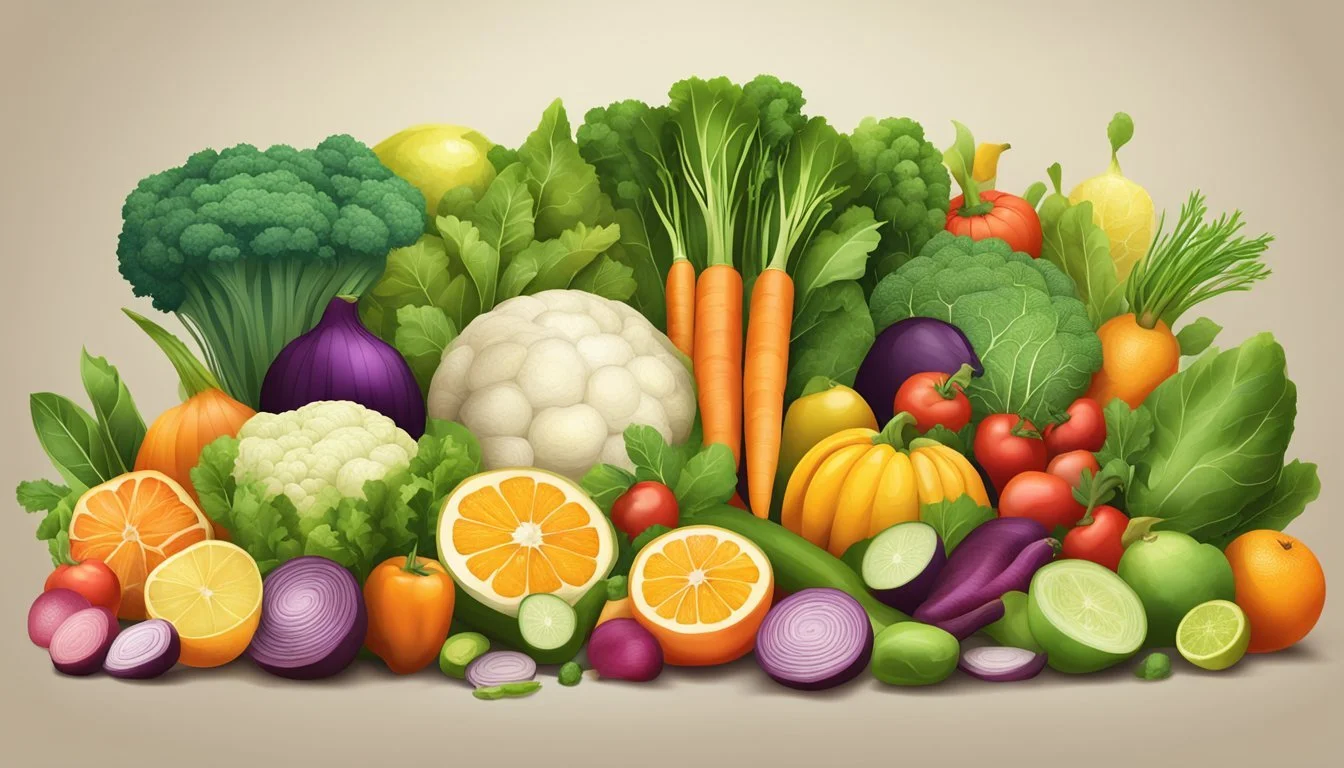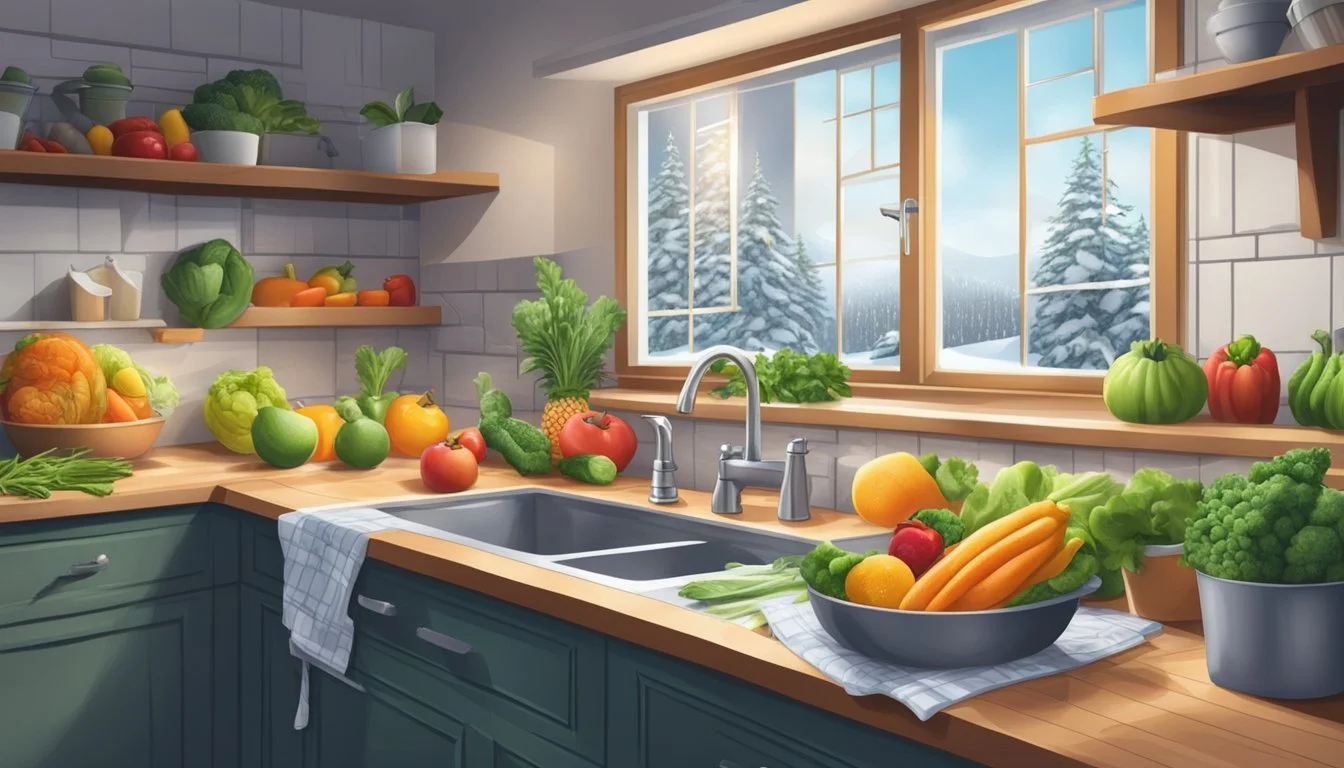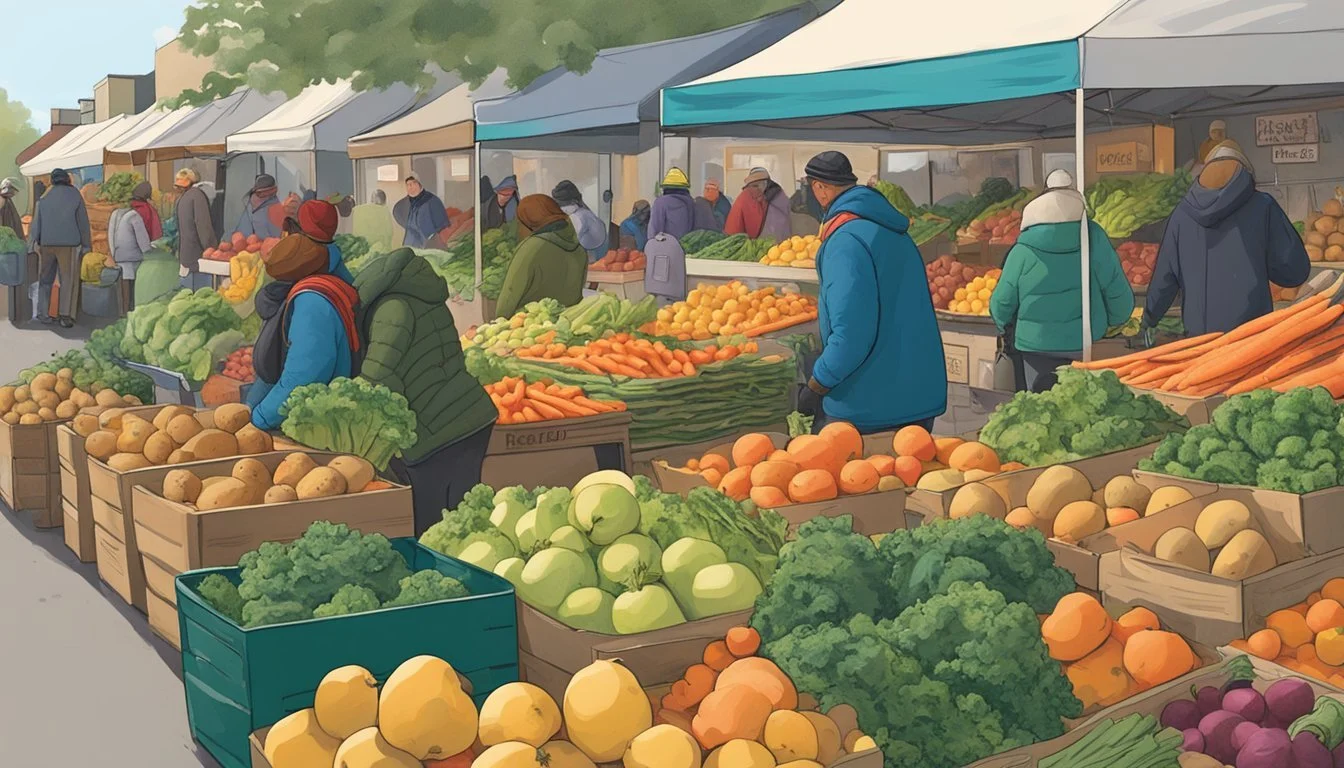Delaware Seasonal Fruit & Vegetables in February
Your Fresh Guide
This Article is Part of our Delaware Seasonal Fruit & Veg Calendar
In Delaware, February marks a time when the selection of seasonal produce is not as abundant as it is during the warmer months. However, there remains a range of fruits and vegetables that can be enjoyed fresh, thanks to cold season harvesting and storage technologies that extend the availability of fall crops. Locavores and health-conscious consumers take pleasure in the crisp textures and rich flavors that winter offerings bring to the table. The focus in February is often on robust storage crops and the last of the hearty greens, which continue to thrive in the cooler temperatures.
Delaware's climate allows for certain vegetables, such as kale (What wine goes well with kale?) and collard greens, to be available due to their frost tolerance. Root vegetables like turnips and sweet potatoes (What wine goes well with sweet potatoes?) are typically stored from late fall and can still be found fresh in local markets. These storied staples contribute to wholesome dishes and provide necessary nutrients during the colder days.
The state's agricultural calendar also suggests that it is an ideal time to enjoy preserved fruits from the previous seasons, such as apples and pears, which maintain their quality post-harvest. While fresh, locally grown berries are not in season, preserved or greenhouse-grown varieties might be available. Consumers can seek out these items for a taste of local flavor during the quiet but still bountiful winter season.
Understanding Seasonality in Delaware
Delaware's geographic location and climate have a direct impact on the availability of seasonal produce. During February, one can expect a range of storage crops and hearty winter vegetables that can withstand the colder temperatures.
Winter's Harvest in February
Delaware shows its resilience in winter with an assortment of produce that survives the frost and thrives in the cold soil. In February, residents often turn to storage crops and preserved goods from previous harvests. This winter month may not boast an abundance of fresh produce, but certain vegetables and goods like root vegetables and winter squashes remain available due to their long shelf life post-harvest.
Common February produce includes:
Carrots (how long do carrots last?)
Potatoes
Winter squash
Onions
The Impact of Climate on Produce
The climate of Delaware, with USDA Hardiness Zones ranging from 7a to 8a, influences the growing season profoundly. Cold winters and the potential for frost define what can be sown and reaped during these months. This seasonality means that February produce is limited to what can either be stored effectively from the fall harvest or what can withstand the cooler temperatures.
Delaware's agricultural success relies on understanding these climate patterns and selecting crops that are well-adapted to winter conditions. Hence, one may not find a broad variety of fresh seasonal produce but can rely on the storage and preservation techniques that extend the availability of local produce through the winter months.
Seasonal Fruits Available
In February, residents and visitors in Delaware can enjoy a variety of fruits that are in season. This selection includes citrus fruits that flourish during cooler months, winter-tolerant berries and apples, as well as tropical fruits that are available due to global trade networks.
Citrus Fruit Varieties
Delaware's winter sees a range of citrus fruits reach their peak. These fruits are known for their refreshing taste and vitamin C content. Some available citrus varieties include:
Lemons: Versatile for both culinary and household uses.
Oranges: Sweet and juicy, perfect for a healthy snack.
Grapefruit: With a bittersweet flavor, grapefruits are great for breakfast.
Winter Berries and Apples
Although not as plentiful as in the fall, certain apple varieties and berries are still available:
Apples: Select varieties that store well over the winter months.
Blueberries: While fresh blueberries may be hard to come by, frozen or preserved blueberries are often available.
Tropical Fruits in Delaware
Tropical fruits can be found even during the colder months, transported from warmer climates:
Kiwis: This small, nutrient-packed fruit adds a tropical twist to any fruit salad or dessert.
Pomegranates: Known for their jewel-like seeds and deep, sweet flavor.
While the selection is more limited compared to the summer months, February still offers a range of fresh and flavorful fruits for Delawareans to enjoy.
Seasonal Vegetables to Enjoy
February in Delaware offers a bounty of vegetables that thrive in cooler conditions. Focusing on these can ensure freshness and optimal taste.
Leafy Greens Selection
Delaware's February climate is suitable for hearty leafy greens. Kale and spinach are packed with nutrients and versatile for cooking. They can be enjoyed raw in salads or cooked in warm dishes.
Kale: Full of vitamins A, K, and C.
Spinach: Rich in iron and calcium.
Root Vegetables and Tubers
Rich in flavor and texture, root vegetables and tubers are plentiful during Delaware's winter month. These include turnips, potatoes, parsnips, carrots, and celery root. Additionally, sweet potatoes offer a sweeter flavor and are excellent when baked or mashed.
Carrots: High in beta-carotene, great for roasting.
Sweet Potatoes: Contain vitamin A; perfect for a variety of dishes.
Cruciferous Vegetables and Their Benefits
Cruciferous vegetables such as broccoli, cauliflower, Brussels sprouts, cabbage, and leeks are in season and bring substantial health benefits. They are known for their potential cancer-fighting properties and high fiber content.
Broccoli: High in vitamins C and K.
Cauliflower: Versatile and can be used as a low-carb alternative.
Incorporating Seasonal Produce in Meals
In February, a variety of fresh produce in Delaware can elevate the taste and nutritional value of meals. Integrating seasonal fruits and vegetables into one's diet ensures peak flavor and often better nutrient profiles.
Healthy and Flavorful Salads
The chills of February are no match for the vibrant flavors of citrus fruits, making them a perfect addition to salads. Blood oranges and grapefruits, with their juicy bursts of acidity, can be paired with dark, leafy greens like kale and spinach that are also in season. Add a crunch with toasted nuts (how long do nuts last?) and a dressing of Eureka lemon juice and olive oil for a salad that is both refreshing and rich in vitamins.
Recipe Suggestion:
Spinach and Citrus Salad
Spinach, segmented grapefruits, sliced blood oranges, chopped walnuts (how long do walnuts last?), and a lemon vinaigrette.
Warm Soups and Stews Recipes
Soups and stews are comforting during the cooler weather, and make excellent use of hearty vegetables. Collard greens can be simmered to a tender perfection in a chunky vegetable stew. For a silky soup, blend roasted seasonal vegetables like carrots and sweet potatoes with a hint of citrus to brighten the flavors.
Recipe Suggestion:
Roasted Carrot and Sweet Potato Soup
Roasted carrots, sweet potatoes, vegetable stock, and a squeeze of orange juice.
Desserts and Sweet Treats
Desserts crafted from seasonal produce offer a balance of sweetness and richness. Pomegranates provide tart seeds that can be sprinkled over sweet desserts like chocolate tarts for a pop of flavor and color. Citrus fruits can be transformed into zesty curds or marmalades that pair wonderfully with cheesecakes or pastries.
Recipe Suggestion:
Citrus Marmalade Cheesecake
Creamy cheesecake with a tangy citrus marmalade topping.
Sides and Appetizers
The month’s harvest offers an array of options for creative side dishes and appetizers (What wine goes well with appetizers?). Roasted broccoli makes an excellent side, especially when it's tossed with a touch of lemon zest (how long does lemon zest last?) and sea salt (how long does sea salt last?). For an appetizer, consider a citrus-infused hummus paired with fresh-cut vegetables.
Recipe Suggestion:
Lemon Zest Roasted Broccoli
Broccoli florets, olive oil, lemon zest, salt, and pepper roasted until crispy.
Seasonal Cooking and Preparation Tips
Embracing the season's bounty, Delaware offers a variety of fresh fruits and vegetables in February that are perfectly suited for winter recipes. Proper storage and cooking techniques are key to maximizing flavor and nutritional value.
Storage Advice for Fresh Produce
To maintain freshness and extend the shelf-life of February produce in Delaware, it’s essential to store items correctly. Most root vegetables, such as carrots and turnips, should be kept in a cool, dark place, such as a root cellar or a ventilated drawer in the refrigerator, to reduce moisture loss and prevent spoilage. Citrus fruits, on the other hand, are best stored in the refrigerator in a mesh bag or the crisper drawer to retain their juiciness and prevent them from absorbing odors.
Here’s a quick reference for storing some common February fruits and vegetables:
Apples: Refrigerate in a plastic bag with holes for up to four weeks.
Pears: Ripen at room temperature and then refrigerate for up to five days.
Citrus: Keep in refrigerator for up to three weeks.
Root vegetables: Store in a cool, dark place or refrigerator drawer.
Leafy greens: Keep in refrigerator, loosely wrapped in a damp cloth or paper towel.
Cooking Techniques for Winter Vegetables
Winter vegetables available in Delaware during February, such as beets and sweet potatoes, are best when their natural flavors are highlighted. Roasting is an excellent method for caramelizing the natural sugars within these roots, which enhances their inherent sweetness. To roast, one should peel and chop the vegetables into uniform pieces, toss with a bit of oil, and cook in a preheated oven at 425°F.
For greens like kale, a quick sauté with garlic and olive oil can be both simple and delicious. For a touch of sweetness, one can add a splash of balsamic vinegar (how long does balsamic vinegar last?). Additionally, soups and stews are ideal for incorporating a variety of seasonal vegetables and can be an easy way to use up produce that is starting to wilt, ensuring that nothing goes to waste.
A summary of cooking techniques:
Root vegetables: Roast to enhance sweetness.
Leafy greens: Sauté quickly to retain color and nutrients.
Soups and stews: Combine varied produce for flavorful, hearty dishes.
Local Food Systems and Markets
Delaware's local food systems thrive in February, though it's not peak season for a variety of produce. However, markets and CSAs continue to connect consumers with locally-sourced food.
Farmers Markets and Their Offerings
Farmers markets operate as a nexus between Delaware's agricultural output and the community. Even in the off-peak month of February, farmers markets are active, primarily offering goods that store well from the previous year's harvest. They become a hub for root vegetables such as carrots and potatoes, which are typically stored from the fall. Local farmers markets also feature products like honey, jams, and preserved fruits - reminders of the richness of past seasons.
Community Supported Agriculture (CSA)
Community Supported Agriculture programs in Delaware enable members to receive a share of fresh produce from local farms. By February, CSAs capitalize on greenhouse-grown items and stored produce to ensure variety. CSAs not only support local agriculture but also reinforce the bond between consumers and growers. Members often enjoy selections of the region's freshest vegetables, herbs, and fruits that are available, maintaining a connection to local farms even when fields are at rest.
Conclusion
In February, Delaware offers a variety of seasonal produce that supports healthy eating and sustainable practices. During this month, consumers can embrace a selection of fruits and vegetables that are fresh and at their peak flavor.
The local harvest brings forth root vegetables and sturdy greens that can withstand the cooler temperatures. Root vegetables such as turnips and sweet potatoes are abundant, while hearty greens like kale and collards provide valuable nutrients. Delaware's agriculture during February focuses on offering these robust options to encourage a diet rich in vitamins and minerals, which align with a healthy lifestyle.
Sustainable agricultural practices are emphasized through the local farmers' markets and community-supported agriculture programs (CSAs). These modes of purchasing encourage low food mileage and support Delaware's economy. Residents have the opportunity to enjoy produce that necessitates fewer transportation resources and promotes ecological balance.
Delaware Seasonal Produce in February Root Vegetables: Turnips, Sweet Potatoes Hearty Greens: Kale, Collards Miscellaneous: Mushrooms
It's important for consumers to recognize the impact of their choices. Opting for seasonal, locally grown produce results in a smaller carbon footprint and bolsters community connections. By choosing seasonal offerings, individuals contribute to a more sustainable future while benefiting from the nutritional advantages of fresh, unprocessed foods.









